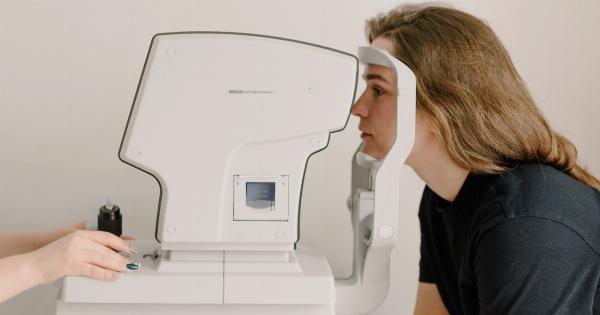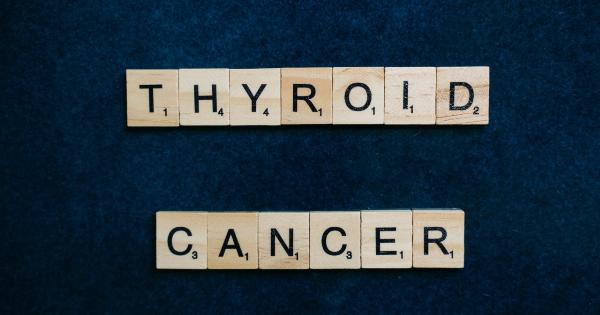Iodine is an essential mineral that plays a crucial role in the functioning of the thyroid gland and the production of thyroid hormones. These hormones are responsible for regulating metabolism, growth, and development in the body.
However, iodine deficiency is a common nutritional problem worldwide, affecting millions of people. In this article, we will discuss how to recognize iodine deficiency and its potential consequences.
Symptoms of Iodine Deficiency
Iodine deficiency can manifest in various symptoms, which may vary in severity depending on the extent of the deficiency. Here are some common signs to look out for:.
1. Fatigue and Weakness
Feeling constantly tired and experiencing weakness, even after getting enough sleep, can be a symptom of iodine deficiency. This is because iodine is necessary for proper energy production in the body.
2. Weight Gain
Iodine deficiency can lead to unexplained weight gain. Thyroid hormones regulate metabolism, and a lack of iodine can disrupt the hormonal balance, resulting in a sluggish metabolism and weight gain.
3. Swelling in the Neck
One of the most visible signs of iodine deficiency is the development of a goiter, which is characterized by an enlarged thyroid gland. The thyroid gland may become visibly swollen and cause discomfort in the neck area.
4. Hair Loss
A lack of iodine can lead to hair loss or brittle hair. Thyroid hormones play a role in hair growth and follicle health, so inadequate iodine levels can disrupt this process.
5. Dry or Flaky Skin
Iodine deficiency can cause dry, flaky skin. The skin may lose its natural moisture and become rough and scaly. This is because iodine is involved in the production of sweat, which helps in maintaining skin hydration.
6. Cognitive and Developmental Issues
Iodine is particularly crucial for brain development, especially during pregnancy and infancy. A deficiency during these stages can lead to intellectual disabilities, impaired cognitive function, and reduced motor skills in children.
7. Impaired Immune Function
Iodine deficiency can weaken the immune system, making individuals more susceptible to infections and illnesses. This occurs because iodine is essential for the proper functioning of the immune system.
8. Menstrual Irregularities
In women, iodine deficiency may cause menstrual irregularities, such as a heavy or prolonged menstrual flow. This is due to the impact of iodine on hormone regulation.
9. Decreased Fertility
Iodine deficiency can lead to fertility issues in both men and women. In men, it may result in reduced sperm count and quality, while women may experience difficulties in conceiving or maintaining a pregnancy.
10. Mood and Mental Health Changes
Inadequate iodine levels can contribute to mood swings, depression, anxiety, and general mental health disturbances. This is because thyroid hormones influence the production and regulation of neurotransmitters that affect mood.
Consequences of Iodine Deficiency
Recognizing the symptoms of iodine deficiency is crucial because if left untreated, it can have serious consequences on overall health and well-being. Some of the potential long-term effects and complications of iodine deficiency include:.
1. Hypothyroidism
Iodine deficiency is a leading cause of hypothyroidism, a condition where the thyroid gland does not produce enough thyroid hormones. This can lead to numerous health problems, including fatigue, weight gain, and impaired cognitive function.
2. Intellectual Disabilities
Severe iodine deficiency during pregnancy can result in intellectual disabilities and developmental delays in children. Adequate iodine intake is crucial for normal brain development in the fetus.
3. Thyroid Cancer
Although rare, longstanding iodine deficiency may increase the risk of developing thyroid cancer. The thyroid gland tries to compensate for the lack of iodine by enlarging, potentially leading to the development of abnormal cells.
4. Pregnancy Complications
Iodine deficiency during pregnancy can have severe consequences on both the mother and the baby. It increases the risk of stillbirth, preterm birth, and complications related to low birth weight.
5. Impaired Growth and Development
Iodine is crucial for proper growth and development, especially in infancy and childhood. Deficiency during these stages can lead to stunted growth, delayed development, and cognitive impairments.
6. Cardiovascular Issues
Iodine deficiency has been linked to an increased risk of cardiovascular problems, such as high blood pressure and heart disease. Thyroid hormone imbalances resulting from inadequate iodine intake can disrupt cardiovascular function.
7. Lowered Immunity
Inadequate iodine levels compromise the immune system, making individuals more susceptible to infections and diseases. This can negatively impact overall health and quality of life.
8. Impaired Metabolism
Iodine is essential for the production of thyroid hormones, which regulate metabolism. Insufficient iodine intake can lead to a slower metabolic rate, making it difficult to maintain a healthy weight.
9. Muscle Weakness
Iodine deficiency can contribute to muscle weakness and discomfort. The lack of iodine affects muscle function and can lead to cramps, stiffness, and reduced physical performance.
10. Mental Health Disorders
Inadequate iodine levels may contribute to the development or exacerbation of mental health disorders such as depression, anxiety, and mood disorders. Thyroid hormones play a crucial role in maintaining mental well-being.
If you experience any of these symptoms or suspect iodine deficiency, it is important to consult with a healthcare professional for proper diagnosis and treatment.



























